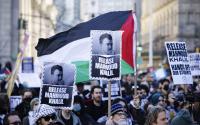12 August 2008The Independent
Georgia's prime minister says he wants more evidence of a Russian halt to military operations because Russian fighter jets had continued to bomb Georgian villages.
Russian President Dmitry Medvedev said earlier today that he had ordered an end to military operations in Georgia. But Georgian Prime Minister Lado Gurgenidze told Reuters that Russian jets were still targeting civilians.
"Despite the Russian president's claims earlier this morning that military operations against Georgia have been suspended, at this moment, Russian fighter jets are bombarding two Georgian villages outside South Ossetia," Gurgenidze said.
His comments came before an AP reporter spotted 135 Russian military vehicles driving through Georgia toward Kodori Gorge — an area of Abkhazia still held by Georgian forces. The reporter said the convoy included tanks, armoured personnel carriers and three pieces of artillery.
At the same time, Russian peacekeepers said that Georgian forces were periodically shooting at forces in South Ossetia, even after Moscow had declared the halt to military operations. Georgia says it has pulled its forces back towards Tbilisi to defend the capital.
Meanwhile French President Nicolas Sarkozy said after a meeting in Moscow with Russian President Dmitry Medvedev that Russia and Georgia had agreed to a ceasefire but had not agreed to a peace deal. he said: "We do not yet have peace deal, we have a provisional cessation of hostilities but this is significant progress."
Gurgenidze had earlier said the Kremlin's statement that it had ceased military operations was the result of intense international pressure on Medvedev.
"We will need more evidence, everyone in this situation needs a signed binding agreement," Gurgenidze said by telephone from an extraordinary meeting of parliament.
"Until that happens we are mobilised, we are prepared for everything," he said. "I do appreciate it (Medvedev's gesture) ... but there has been more damage to infrastructure and civilian casualties today."
Gurgenidze said the Interior Ministry had informed him of two bombings around 20 kilometres from the town of Gori that took place after Medvedev's statement.
Russia has denied attacking the town of Gori and has denied any incursions outside the disputed region of South Ossetia.
The Georgian government said Russian fighter aircraft were bombarding the villages of Ruisi in the Kareli region and Sakoringo in the Kaspi region, all in Georgia proper and outside the main conflict zone of South Ossetia.
At 2:00 pm (10:00 GMT), after Medvedev's order to halt operations, Russian military forces also destroyed an ambulance in the Khashuri region of Georgia proper, the Georgian government said.
"Does that look like the cessation of hostilities?" Gurgenidze said. "It could be that the executive order hasn't trickled down to the rank and file, or it could mean something else."
French President Nicolas Sarkozy arrived in Moscow today with the French and Finnish foreign ministers.
France holds the rotating presidency of the European Union, and Finland holds the rotating presidency of the Organisation for Security and Cooperation in Europe (OSCE).
US President George Bush has voiced his alarm over the conflict to Medvedev by phone.
And Nato said that the situation in Georgia must be restored to the way it was before fighting erupted in the breakaway region of South Ossetia last week.
Speaking after ambassadors of the US-led defence alliance met Georgia's ambassador at Tbilisi's request, Secretary-General Jaap de Hoop Scheffer told a news conference: "It is very important that all parties go back to the status quo ante, that is as it existed on 6 August."
He said the 27 Nato allies reiterated in the strongest terms that Georgia's sovereignty and territorial integrity must be respected.
Gurgenidze said the ceasefire agreement drafted by French Foreign Minister Bernard Kouchner could be the start of a lasting peace if Russia signed it.
"President Saakashvili has signed the four-point Kouchner plan, which is being discussed in Moscow right now. Signing that would be a start," Gurgenidze said.
"The international community must succeed in bringing a durable and proper end to this," he added.






